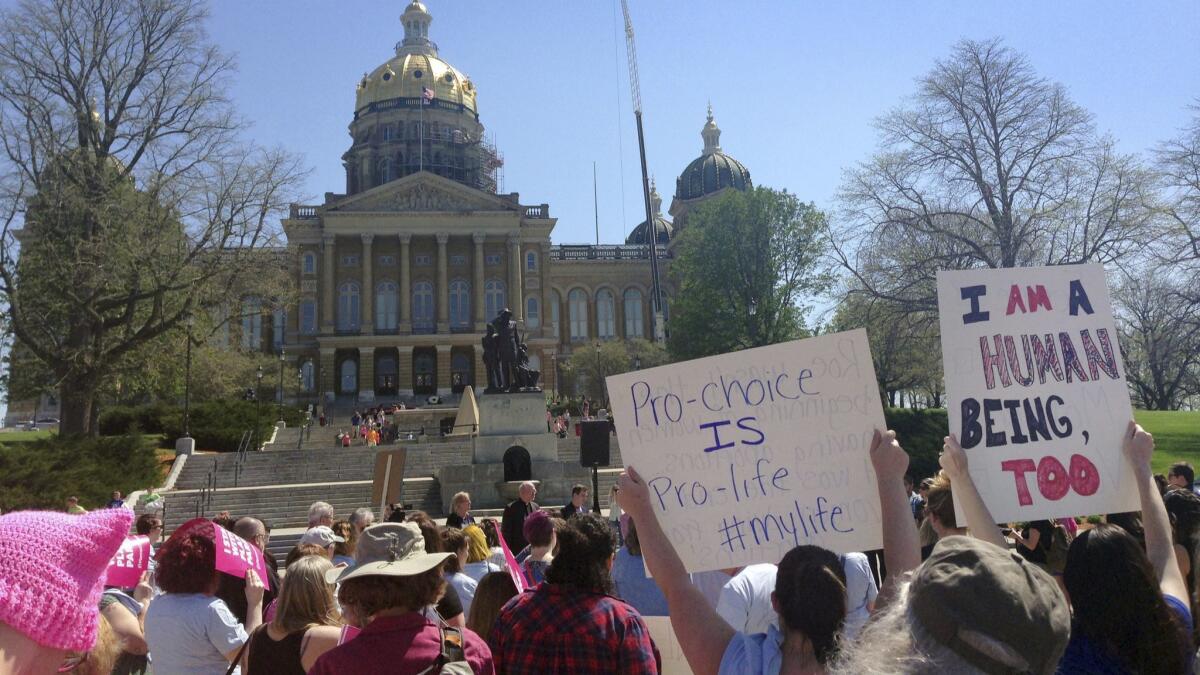Iowa Supreme Court blocks 72-hour waiting period for abortion

- Share via
Reporting from Des Moines, Iowa — The Iowa Supreme Court struck down a law on Friday that requires a 72-hour waiting period for women seeking an abortion, ruling that the restriction was an unconstitutional burden on women.
The court issued a 5-2 decision concluding that the restriction violated the Iowa Constitution because its restrictions on women “are not narrowly tailored to serve a compelling interest of the state.” Justices also noted the waiting period could force delays, increase costs and in some cases prevent a woman from legally obtaining an abortion.
“Autonomy and dominion over one’s body go to the very heart of what it means to be free,” the justices wrote. “At stake in this case is the right to shape, for oneself, without unwarranted governmental intrusion, one’s own identity, destiny, and place in the world. Nothing could be more fundamental to the notion of liberty.”
The ruling comes in a lawsuit filed by Planned Parenthood of Iowa and the American Civil Liberties Union of Iowa. The groups sued the state shortly after the law was approved last year, arguing that a woman’s right to an abortion was among the core privacy rights protected by the Iowa Constitution and federal law.
Attorneys for Planned Parenthood and the state had no immediate comment on the ruling.
The waiting period is part of a larger state law that bans most abortions after 20 weeks of pregnancy. The 20-week ban is in effect and isn’t part of the legal challenge. A district court judge upheld the law’s waiting period provision in September, but the Supreme Court blocked its implementation a month later so it could consider arguments from both sides.
In its Friday ruling, the high court noted it wasn’t concluding that a woman’s right to terminate a pregnancy was unlimited. The ruling, written by Chief Justice Mark Cady, outlined the difficulty courts have in reaching decisions on abortion.
“We do not, and could not, endeavor to discern the precise moment when a human being comes into existence. We have great respect for the sincerity of those with deeply held beliefs on either side of the issue.
“Nevertheless, the state’s capacity to legislate pursuant to its own moral scruples is necessarily curbed by the constitution. The state may pick a side, but in doing so, it may not trespass upon the fundamental rights of the people,” Cady wrote.
Two justices, Edward Mansfield and Thomas Waterman, disagreed. Mansfield’s dissenting opinion argued that the court’s majority opinion forgoes “accepted methods of constitutional interpretation,” and instead at times relies “on an undertone of moral criticism toward abortion opponents.”
Mansfield is on President Trump’s list of possible nominees to the U.S. Supreme Court.
Planned Parenthood had argued that Iowa lawmakers had chosen to impose more severe burdens on women seeking an abortion “than almost all other states.” The group noted that the Iowa Supreme Court had recognized privacy as a fundamental right in previous cases, and argued that abortion was a core privacy right that should be treated like other fundamental rights.
The group’s attorney, Alice Clapman, argued in court arguments that women who seek abortions “already make careful decisions. They already contend with massive obstacles in carrying out their decision.” She said the mandatory waiting period would make those obstacles far worse.
Iowa Solicitor General Jeffrey Thompson, who defended the law for the state, argued that protecting unborn life was a state interest of the highest order and that abortion wasn’t a fundamental right under the Iowa Constitution. He said the waiting period provides time for women to consider information that abortion providers are required to provide, including an opportunity to view an ultrasound or hear a fetal heartbeat.
“The informed choice provision does not remove the ultimate decision from the woman. Rather, it reflects the hope of the legislature that after receiving the information and taking some time to consider it, some women will choose to continue a pregnancy that they might otherwise have terminated,” he wrote in court documents.
Iowa lawmakers earlier this year also passed a bill prohibiting abortions after a fetal heartbeat is detected. That law also is on hold pending a legal challenge.
More to Read
Sign up for Essential California
The most important California stories and recommendations in your inbox every morning.
You may occasionally receive promotional content from the Los Angeles Times.










